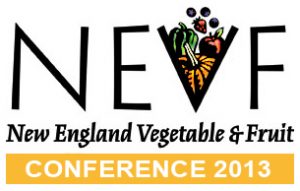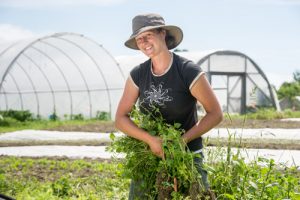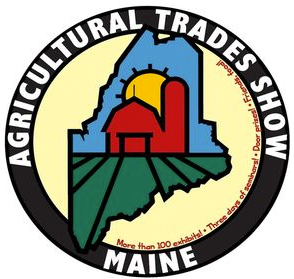Farm Scoop — December 2013/January 2014
New England Vegetable and Fruit Conference
 Dates: December 17–19
Dates: December 17–19
Time: 9:30 a.m. – 4:30 p.m. sessions, plus evening events
Location: Radisson Hotel, 700 Elm St., Manchester, NH
Cost: $105 for the first member of farm or business; $75 each additional member.
Includes more than 25 educational sessions over 3 days, covering major vegetable, berry and tree fruit crops as well as various special topics. A Farmer to Farmer meeting after each morning and afternoon session will bring speakers and farmers together for informal, in-depth discussion. There is also an extensive Trade Show with over 100 exhibitors. For more information: http://www.newenglandvfc.org.
Cornell Small Farms Marketing Class
 Dates: Monday, January 6 – Monday, February 10, with webinars once weekly on Monday evenings
Dates: Monday, January 6 – Monday, February 10, with webinars once weekly on Monday evenings
Time: 6:30 – 8:00 p.m. EST
Location: online
Cost: $200; multiple people from the same farm may participate without paying extra
It is rare to find someone who got into farming because they’re passionate about selling. It’s the growing part that attracts most people, and many farmers start small enough that they can get away without a well-planned marketing strategy at first. But as the farm expands and competition grows, it’s harder to be successful without a strategy. New and experienced farmers alike will benefit from honing their marketing skills with the Cornell Small Farms Program’s online course BF 201: Effective Marketing for the Busy Farmer. Join popular Cornell Cooperative Extension educators Matt LeRoux and Laura Biasillo, and several savvy farmers to learn and apply practical, on-the-ground tips to focus your marketing and use your limited time wisely. The course runs Monday, January 6 – Monday, February 10, with webinars once weekly on Monday evenings from 6:30-8:00 p.m. EST. The cost is $200, and multiple people from the same farm may participate without paying extra.
2014 Maine Agricultural Trades Show
 Dates: January 7 – 9, 2014
Dates: January 7 – 9, 2014
Times: Tuesday, January 7 from 9:00 a.m. to 5:00 p.m., Wednesday, January 8 from 9:00 a.m. – 8:00 p.m., and Thursday, January 9 from 9:00 a.m. – 3:00 p.m.
Location: Augusta Civic Center, Augusta, Maine
Cost: FREE!
The 73nd annual Agricultural Trades Show will be held at the Augusta Civic Center on January 7-9, 2014. Admission is FREE! This show provides an atmosphere to walk through, observe, and educate the public about different areas of agriculture. Many commercial agriculture associations will hold their annual meetings and sponsor educational workshops over the course of the three days. A full schedule of events and program will be posted on the Department of Agriculture, Conservation and Forestry website in December 2013. Show hours are Tuesday, January 7 from 9:00 a.m. to 5:00 p.m., Wednesday, January 8 from 9:00 a.m. – 8:00 p.m., and Thursday, January 9 from 9:00 a.m. – 3:00 p.m.
Value-Added Producer Grant (VAPG)
The Value-Added Producer Grant (VAPG) Notice of Funding Availability (NOFA) was issued today in the Federal Register. Applicants must demonstrate that they meet all definition requirements at 7 CFR 4284.902 for one of the following applicant types: Independent producer, agricultural producer group, farmer or rancher cooperative, or majority-controlled producer-based business venture. If you are a Harvester, it is the Agency’s position that you may only apply as an Independent Producer applicant type because harvester operations do not meet Agency definition requirements for a Farm or Ranch. This program provides funds for planning or working capital. There are separate and distinct applications for each. Funds cannot be used for construction, machinery or equipment. These are available at the USDA Rural Development website; all program regulations are also available on this website. There is a matching funds requirement of at least $1 for every $1 in grant funds provided by the Agency (matching funds plus grant funds must equal proposed total project costs). There are new maximum limits for grant requests. The maximum grant amount for a planning grant is $75,000, and the maximum grant amount for a working capital grant is $200,000. This is a change from the last round of funding. To be eligible for funding, you must submit your application by February 24, 2014. Paper applications must be postmarked and mailed, shipped or sent overnight by this date.
USDA Farm Storage Loans Available
USDA Maine State Farm Service Agency (FSA) State Executive Director, Donovan E. Todd, III, reminds farmers and ranchers that Farm Storage Facility Loans (FSFL) are available through FSA.
The Farm Service Agency offers low-interest loans to grain producers to build new or upgrade existing storage facilities and permanent drying and handling equipment. Loan opportunities
- New conventional-type cribs or bins, oxygen-limiting and other upright silo-type structures, and flat-type storage structures designed for whole grain storage,
- Perforated floors, safety equipment, quality improvement equipment, electrical equipment and concrete components considered essential for a fully functional storage facility,
- Remodeling existing storage facilities to increase storage capacity.
Farm storage facility loans must be approved prior to site preparation, equipment purchase or construction, and must be secured by a promissory note and security agreement. The new maximum principal loan amount is $500,000. Participants are required to provide a down payment of 15 percent, with CCC providing a loan for the remaining 85 percent of the net cost of the eligible storage facility and permanent drying and handling equipment.
Additional security is required for poured-cement open-bunker silos, renewable biomass facilities, cold storage facilities, hay barns and for all loans exceeding $50,000. New loan terms of seven, 10 or 12 years are available depending on the amount of the loan. Interest rates for each term rate may be different and are based on the rate which CCC borrows from the Treasury
Contact your local county office for more information.
Farm Aid Needs Your Feedback
The national farm organization, Farm Aid, is exploring their role in the food and farm movement and how they communicate that to you.
Farm Aid’s mission is to build a vibrant, family farm-centered system of agriculture in America. Farm Aid artists and board members Willie Nelson, Neil Young, John Mellencamp and Dave Matthews host an annual concert to raise funds to support Farm Aid’s work with family farmers and to inspire people to choose family farm food. Since 1985, Farm Aid has raised more than $43 million to support programs that help farmers thrive, expand the reach of the Good Food Movement, take action to change the dominant system of industrial agriculture and promote food from family farms.
The survey will take approximately 10-15 minutes to complete and is an opportunity to share your insights. Your responses will be anonymous and confidential.
Please do not hesitate to contact Jessie Deelo at Farm Aid if you have any questions or concerns. She can be reached at jessie@farmaid.org or 617.354.2922.
AgriTourism Link
Is your farming operation involved in agritourism or is an agritourism enterprise in your farm’s future? Rutgers University has developed an excellent resource for farmers and others on the topic. UMaine Extension is collaborating with Rutgers on this project. The website has 6 training modules, 3 short training videos, and plenty of fact sheets and support materials. This winter could be a great time to explore the possibilities.
What Are Lenders Looking For?
A UVM Extension New Farmer Project webinar, Thursday, December 19, Noon – 1:00 p.m., EST
Join Benneth Phelps, Loan and Outreach Coordinator for the Carrot Project for a webinar on the “tools” that every farm business should have to help them obtain financing, even if they don’t need it now. Improve your understanding of available financing and gain perspective on how financing can help your business succeed! Benneth Phelps is Loan and Outreach Coordinator at The Carrot Project, a non-profit offering financing and assistance to both farms and food enterprises in the Northeast. Originally a fruit and vegetable farmer by training, she has a decade of experience farming in New England.
This webinar is free and requires no preregistration. Newcomers to online learning are welcome. All you need to participate is internet access and a computer that you can hear sound through. To participate, please go to http://go.uvm.edu/aemon at about 11:45 a.m EST on December 19, 2013 and click on the webinar title. For more information, contact newfarmer@uvm.edu or call 802.223.2389 x203. If you require accommodations to participate in this program, please let Jessie Schmidt know by December 15, 2013 at 802.223.2389 or 1.866.860.1382 (toll-free in VT) or newfarmer@uvm.edu so we may assist you. If you have not participated in a webinar before, we recommend you download the necessary software for free the day before the webinar is scheduled.
Cornell Small Farms Program
Step One to farming profitably is having organized financial records. Step Two is knowing how to read what those records are telling you. If you don’t yet have a record-keeping system set up, or you aren’t happy with your current system, have no fear! The upcoming 6-week online course BF 104: Financial Records: Setting Up Systems to Track Your Profitability is perfect for you. This course will help you create a record-keeping system that is as simple or complex as you need it to be, in Excel or Quickbooks.
(Incidentally, Step Three to farming profitably is taking corrective action if you don’t like what your current financial records tell you about your business. But that’s covered in BF 203: Holistic Financial Planning)
“It’s been hard for me to take my focus off production and spend time on record keeping — it always falls to the end of my long to-do list. But this course made me realize that once I have a good system set up, it doesn’t have to take long to maintain, and the information I get from these records is helping me feel much more confident about my farm.”
— farmer participant from Jan. 2013 BF 104 course
If you complete the course you will:
- Appreciate why keeping farm financial records is essential.
- Be familiar with how a financial record keeping system is organized and why it is beneficial for farmers.
- Be able to set up a simple spread sheet (MS Excel) and software program (QuickBooks Pro) to start financial data collection.
- Learn to calculate simple business ratios to assist in management decisions.
- Discover requirements used by lending institutions to make loan determinations.
The course runs Mon. Jan. 13 – Feb 17, with webinars once weekly on Monday evenings from 6:30-8:00 p.m. EST. The cost is $200, and multiple people from the same farm may participate without paying extra.
See the BF 104: Financial Records course description for more on the target audience, instructors, and course outline.
BF 104: Financial Records – Setting Up Systems to Track Your Profitability is part of the line-up of 12 online courses offered this Fall, Winter and Spring by the Cornell Small Farms Program. To learn more about each course, please visit http://nebeginningfarmers.org/online-courses. From this site you can learn more about our instructors, see answers to Frequently Asked Questions, read details for each course, and view the calendar of course offerings for 2013-2014.
Courses often fill very quickly, so don’t miss your chance to sign up today!
Get Your Business Energy Audit While Grant Funds Last!
Maine Rural Partners currently offers a heavily discounted energy audit and renewable assessment for Maine’s farms and small businesses. From demand management techniques to equipment upgrades, the audit delivers tailored cost saving recommendations and clear payback analyses for your operation. The audit also qualifies your business to apply for USDA grants, loans, and cost-shares to underwrite efficiency investments.
If you are interested in exploring solar, biomass or heat pump technologies, the energy solution provider conducting the audit can perform a renewable assessment as well for your business. Following the assessment, you may apply to become a Farm Energy Partners demonstration site, which brings more technical and financial assistance to the table. An audit is required to receive the renewable assessment.
To be eligible, you must qualify as an agricultural producer or rural small business. Priority is being given to farms and food-related businesses. If you are interested taking advantage of this opportunity, contact Matt George at 207.778.3885 or matt@mainerural.org. Or fill out the free Business Energy Survey at www.mainerural.org to get started and Matt will contact you.
Note for Agricultural Producers: The FY14 NRCS Energy Initiative Sign-up Deadline is December 20th. Order an MRP audit NOW to apply for implementation assistance (payment amounts not yet available but applications accepted in county offices).
